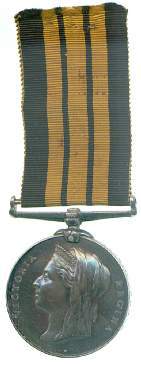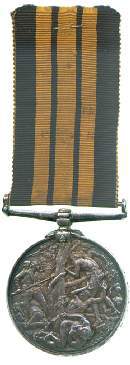Current Location: In storage
Maker(s)
Mint:
London
Artist:
Wyon, Leonard Charles
Artist:
Poynter, Edward John
Ruler:
Victoria (1837-1901)
Ruler:
Victoria regina
(With the title of)
Entities
Categories
Description
Peace-keeping operations in the British possessions in Africa, as anywhere else, required a large number of small campaigns, several of which, from 1892 until 1900, were considered to merit this medal, which in terms of design is a continuation of the Ashantee War Medal. Recipients who held that medal already were therefore awarded only extra clasps.
The coastal strip of what is now Kenya was in the 1880s part of a territory of the Sultan of Zanzibar known as Zanj. Its extent was settled by German and British treaty in 1886, but in 1890 the Heligoland-Zanzibar Treaty saw German interests in the area ceded wholly to Britain, and Zanzibar became a British protectorate that year. The Zanj was thereafter subsumed into the administration of British East Africa, which would later become modern Kenya.
Until the opening of rail links, trade in this area had to be carried out by caravan, which was frequently subject to raiding by tribes from further inland. One such tribe was that of Chief Rashid of M'wele, and a quantity of British forces were occupied in suppressing his efforts between 1895 and 1896.
The medal for this campaign is almost unique among British campaign medals as, although it is of the regular East & West Africa type, no bar was issued. Instead the campaign's identity was engraved at the top of the rim. This makes the medal impossible to distinguish from the Ashanti Medal when worn.
This example was awarded to Able Bodied Seaman J. Duggan who served aboard HMS St George, which joined the campaign fresh from that on the Brass River. (Her complement later earnt another medal which has ended up in the Watson Collection.) Lester Watson purchased the medal from the London dealers Spink at some point before 1928.
Notes
History note: Gift of L. Hoyt Watson; ex Lester Watson Collection, bt Spink before 1928
Legal notes
Given by Lester Watson through Cambridge in America, 2009
Measurements and weight
Diameter: 36.2 mm
Weight: 35.01 g
Acquisition and important dates
Method of acquisition: Given
(2009)
by
Watson, Lester
Dating
1892
-
1900
Materials used in production
Silver
Techniques used in production
Struck
Inscription or legends present
Inscription present: Bust of Victoria facing left with veil
- Text: VICTORIA REGINA
- Location: Obverse
- Type: Design
Inscription present: Scene of bush fighting around tree with fallen African to fore
- Location: Reverse
- Type: Design
References and bibliographic entries
Identification numbers
Accession number: CM.1211-2009
Primary reference Number: 141305
Watson Catalogue: 104
Ordering: M-0094
Previous object number: LW.0094
Stable URI
Audit data
Created: Saturday 6 August 2011
Updated: Monday 25 March 2024
Last processed: Friday 16 May 2025
Associated departments & institutions
Owner or interested party:
The Fitzwilliam Museum
Associated department:
Coins and Medals





